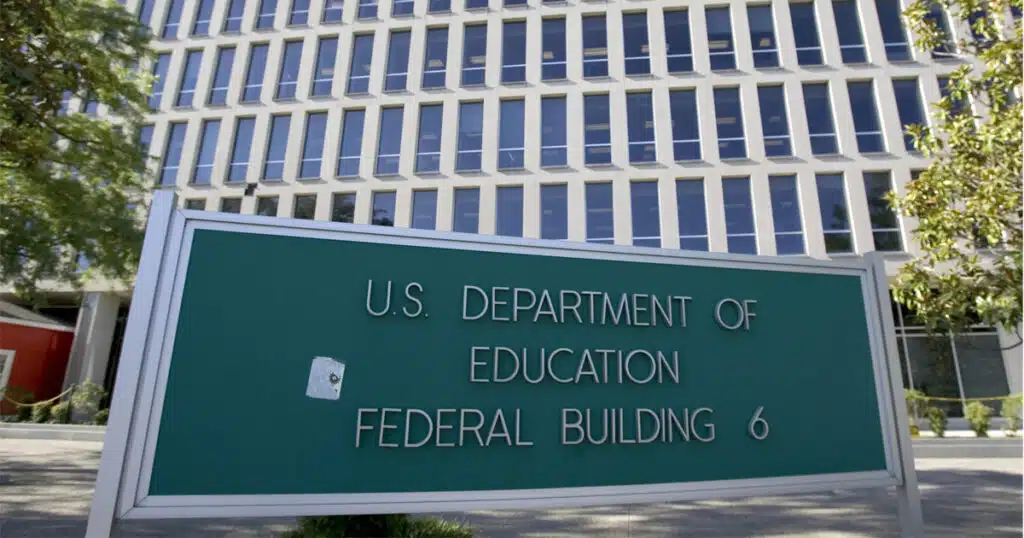
Multiplication, Biden-Style: School Bias Cases Doubled
While limiting strings-attached grants and curbing federal regulation, President Trump’s efforts to dismantle the Department of Education also take aim at a key tool bureaucrats use to oversee schools in all 50 states: civil rights investigations.
Probes handled by the department’s Office for Civil Rights (OCR) against public schools, colleges and universities roughly doubled during the Biden administration, topping 20,000 last year. Investigations by hundreds of OCR lawyers and staff members – and responses to them by untold numbers of school officials and administrators – touched on everything from allegations of sexual violence and disability accommodations to website compatibility.
Defenders of the office say it has been an invaluable protector of civil rights for America’s nearly 70 million students. They say eliminating or even downsizing the office, which has already begun, would kneecap thousands of ongoing investigations while abolishing a prime instrument of justice.
“This reckless action strips students of vital resources and tears down statutorily mandated functions that are essential to addressing racial and economic inequality in education,” the ACLU declared last month. Trump, it said, has put “millions of students’ education and civil rights at risk.”
Advocates for handicapped students, who until recent years accounted for half of all complaints, are concerned they might get short shrift in the Trump administration and have gone to court to block cuts. “We have many members who file complaints, and it has left many of them in limbo, or distraught, thinking there will be no accountability,” said Selene A. Almazan, legal director of the Council of Parent Attorneys and Advocates, plaintiffs in a suit filed March 14.
But backers of Trump’s effort to eliminate the Department of Education counter that the Office for Civil Rights is a symbol of how the federal government has expanded its reach into what they describe as chiefly local matters. They say its investigative arm has been designed to make it as easy as possible for the department to maximize its influence and oversight through investigations.
A complainant does not need a personal connection to a school. Indeed, petitioners don’t even have to live in the same state, and legal standing is not a factor. They do not even need to identify themselves. They are not required to try to resolve their problems at the local level before notifying the feds – though many do. Consequently, the office’s operations sometimes function as a nationwide anonymous sounding board rather than a source of last resort, a place where anyone can make a federal case out of any slight, real or perceived.
Although OCR probes include many serious allegations, the system’s structure means the number of cases can be inflated through duplication, serial filers and ambitious bureaucrats.
“The numbers aren’t really what they first appear,” said Teresa R. Manning, policy director at the National Association of Scholars, a conservative counterweight in higher education to the liberal American Association of University Professors. “A lot of this was by design. If they didn’t have complaints, they wouldn’t have jobs, so a lot of federal bureaucrats and campus officers want any grievance to become a federal case.”
The numbers themselves are unclear. Neither the Department of Education nor its Office for Civil Rights responded to multiple requests for comment, and a listed phone number is no longer manned daily; voice messages left there were not returned. But it appears the administration has laid off some 240 people in the OCR, shuttering at least six of its 12 regional offices. Currently, eight of 22 “key staff” positions there are vacant, according to its website.
When Trump and Secretary of Education Linda McMahon first announced layoffs in February, reports mentioned 12,000 active investigations listed on the OCR database, which was last updated on Jan. 14. Last month, Sen. Bernie Sanders announced his own report on the office, claiming 6,800 cases would be shortchanged by the layoffs.
But no matter which total is used, the claim that U.S. schools are teeming with incidents of overt racism or sexism, or bias against handicapped students, is misleading, according to experts familiar with the OCR and its work.
In theory, every complaint is reviewed to determine if it constitutes discrimination on the basis of race (“Title VI”), sex (“Title IX”), or disability. If so, the Office for Civil Rights can open an investigation, or its attorneys can allege that there are “systemic” violations and trigger much broader investigations.
Such initiatives were highlighted in a glossy report the office released on Jan. 16, four days before Trump’s inauguration. The office appears to have published six such “special reports” since 2016, with half of those during Biden’s term. Two of them – the first and another in 2021 – dealt with alleged “racial disparities” or “equity” in school discipline.
This looks like a more proactive OCR following the age-old practice of boosting the cases on its books and then insisting it needs more funding, said Jim Blew, a co-founder of the Defense of Freedom Institute and a former assistant secretary of education in Trump’s first term.
“Skepticism is legitimate, because by declaring something is ‘systemic,’ then rather than resolve that one issue they can turn it into a federal case,” Blew said. “And if you’re going to interpret the discrimination on much different and broader levels than ever before, that’s going to increase the number of complaints, too.”
RealClearInvestigations found that, despite claims that cuts to OCR will impede “prompt” action or justice for filers, the office did not always handle complaints promptly. Among the 12,000 ongoing investigations listed in the OCR database – half of which involved disability complaints – RCI found active investigations into alleged incidents that occurred in 2016 or 2017, long after any students at the schools in question would have departed. Many alleged incidents also triggered more than one investigation, meaning the “thousands” are fewer than they first appear.
The investigations can take years. Alabama A&M University, for example, is under investigation for “sexual violence” that allegedly occurred on Aug. 24, 2016. The university did not respond to requests for comments on this alleged incident or general compliance with OCR.
Similarly, on Aug. 2, 2017, an alleged incident in Mississippi’s Greene County School District sparked two investigations, one for racial harassment and another for “retaliation” that remain active, according to OCR’s website.
Also, totals were swollen by one unnamed individual. For example, in 2022 when OCR received 9,948 complaints of Title IX violations, nearly three out of four – 7,339 – came from this person. That same individual slipped a bit the following year, accounting for only 69% of the 5,590 complaints. RCI asked several people familiar with Office of Civil Rights work who this person might be, but none said they knew.
The number of complaints skyrocketed during the Biden administration, doubling the average that had held for more than a decade, records show. Last April, Biden regulators sought a radical expansion of Title IX sex discrimination protection to cover things like “gender identity.” That attempt was later blocked by the courts.
Through President Obama’s two terms and Trump’s first term, the office received just under 10,000 complaints annually. In 2022, however, that figure shot up to a record 18,804 and did not stop climbing. It jumped 18% in 2023 before topping 20,000 complaints for the first time in 2024, according to OCR.
It’s not exactly clear what accounted for the big increases, according to experts. But the usual breakdown of classification of complaints changed. Instead of disability complaints comprising more than half of the total OCR received, 42% of those filed in 2023 concerned sexual discrimination, while disability complaints fell to a bit more than a third, according to the office’s figures.
Office for Civil Rights attorneys can launch investigations, or encourage schools to do so, via the well-known “Dear Colleague” letter that alerts administrators to how regulators plan to interpret federal laws. It was just such a “Dear Colleague” letter in 2011 from Catherine Lhamon, who headed the Office for Civil Rights under Obama and Biden, that urged schools to use the lowest possible level of evidence in sexual harassment or assault cases, to make it easier for people to request a remedy to perceived injustice.
“If you’re going to interpret the discrimination in much different and broader terms than ever before then you’re going to increase complaints,” Blew said. “It should be obvious there are certain interests that care about padding their Office of Civil Rights numbers.”
‘Administrative Bloat’
In the face of rising Office for Civil Rights investigations, letters and complaints, schools have been forced to add more layers of administrators and attorneys. Those offices also grew during Biden’s term, when an emphasis on “diversity, equity and inclusion” departments and offices swelled higher education payrolls.
“It has led to administrative bloat, too, as tuition goes to deanlets and bureaucrats,” Manning said. “They often partner together with other entities on campus, and you have many bureaucrats who feed complaints.”
In its January report, OCR reported that it had received 71,385 complaints during Biden’s term and had resolved 56,383 of them. But the backlog of complaints has grown, and in the 13 years covered by the report it was only during Trump’s first term that the office reported resolving more complaints than it received. At least one person who has filed numerous complaints with the OCR suspects that some of the backlog results from an unwillingness to tackle cases that do not fit progressive orthodoxy.
Mark Perry, a professor emeritus at the University of Michigan, who specializes in complaints challenging race- and gender-based scholarships, fellowships and other programs, said OCR has opened 423 investigations into his complaints since he started filing them in 2019.
“I currently have nearly 300 complaints backlogged at OCR, some going back to 2019 and 2020 that have either never made it through the evaluation stage to being opened for investigation and others opened for investigation back in 2019, 2020, and 2021, etc. that have never been resolved,” he said. “Now it’s possible I’m being targeted and slow-walked for being a repeat filer for complaints alleging discrimination against men and whites.”
Perry based that belief, in part, on a handwritten letter he received from an OCR employee in its Chicago branch in September 2023 in response to a Chronicle of Higher Education article about Perry’s filings. “OCR has no impetus, sadly, to advance your cases, total failure in HQ,” the letter said. “Your cases just sit with no activity.”
The delays are especially odd, in Perry’s opinion, given that he is a professional who accompanies his complaints with printed evidence of the specific grant or program he thinks should be curtailed or made available to all students. “My complaints are simple; they should only take a couple of months,” he told RCI.
Another more recent, consistent filer is the Equal Protection Project, launched by conservative Cornell Law School Professor William Jacobson, who runs the Legal Insurrection website. In 2025, the project has averaged an OCR complaint a week, and has filed 70 complaints since it began in February 2023.
Like Perry’s, the project’s focus is on clear violations of the plain language of statues, Jacobson said. On April 1, the project filed a complaint against the Pennsylvania College of Technology, an affiliate of Pennsylvania State University, for 12 scholarships that allegedly “discriminate on the basis of race, color, national origin, and/or sex in violation of Title VI and Title IX, respectively.”
For now, it’s unclear what will happen to the thousands of investigations on the office’s books, or to future complaints like disability grievances filed by Almazan’s group. The laws require a direct interference with a student’s education to validate a complaint, a distinction drawn more by the courts than administrators and bureaucrats who give themselves wide latitude to pursue their own enforcement goals, experts said.
“Biden and the Democrats tend to tinker with the language, creating ‘subjective’ offenses that are a moving target and raise due-process concerns,” Manning said. “The courts have tried to rein it in.”
Even as it appears intent on limiting the Education Department’s reach, the Trump administration has also signaled that it will not completely surrender the use of federal power to influence local schools. It has vowed to root out antisemitism on college campuses, biological men competing against women in sports, and diversity, equity and inclusion programs the administration says violate the clear letter of discrimination laws.
On April 7, McMahon announced a special investigative office, staffed by the Education and Justice departments, to enforce “Title IX to protect female students and athletes.”
This article was originally published by RealClearInvestigations and made available via RealClearWire.



